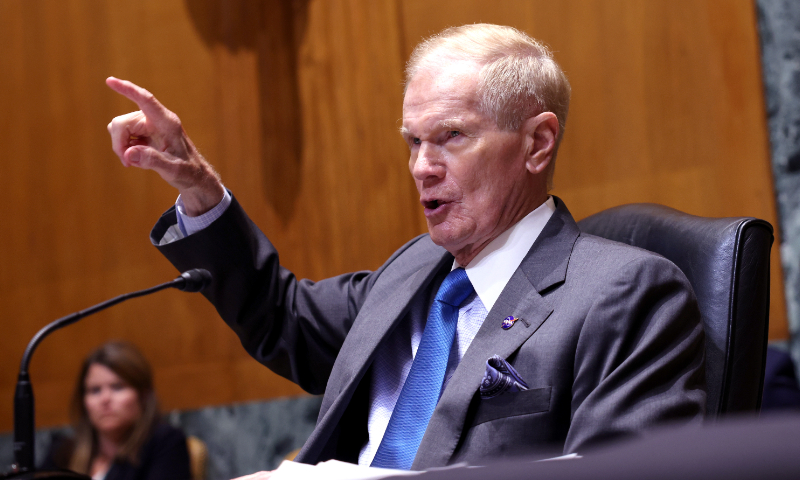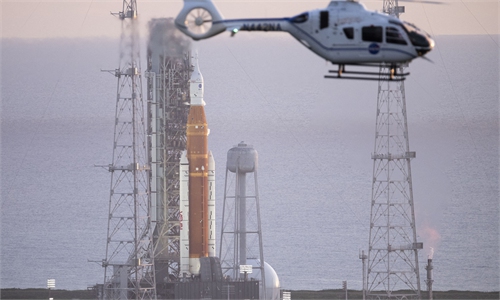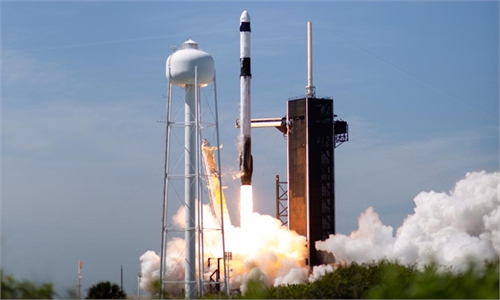NASA chief’s ‘cliché’ accusations against China ‘reflect lack of confidence and narrow mindset’

National Aeronautics and Space Administration (NASA) Administrator Bill Nelson testifies during a Senate Appropriations Subcommittee on NASA's fiscal year 2022 budget request at the Dirksen Senate Office Building on June 15, 2021 in Washington, DC. Photo: VCG
In an interview released Sunday, the US’ NASA chief once again smeared China's space missions and vowed to beat China in the “moon race.” The latest barrage of attacks was slammed by Chinese experts as a reflection of a lack of confidence and a dangerous, narrow Cold War mentality in the US.
NASA Administrator Bill Nelson accused China of being “one of the very few nations” that would not be partners with the US and that it is being “very secretive” in terms of space programs in an interview with Nikkei Asia published on Sunday.
In the meantime, Nelson stated that he believes the US will beat China in terms of sending a manned spacecraft to the moon.
The two countries both have similar visions to launch a crewed moon probe in the next decade. China announced that its manned rocket for the mission is expected to be constructed by 2030, while NASA has pushed back its moon landing to 2025 or later.
Nelson's unsubstantiated accusations fully reflect that the US lacks confidence in its aviation development, experts told the Global Times.
Nelson's renewed hype of the Chinese aviation threat theory is actually a common NASA trope, spinning an external excuse to spur the US Congress to pass more related budgets, Song Zhongping, a space analyst and TV commentator, told the Global Times on Sunday.
"China has never said it aims to engage in a so-called space race with the US," he said, noting that the past race with the Soviet Union and Cold War mindset trapped the US.
In fact, publicly attacking China’s space programs has become normal for NASA in the past few months. In September, Nelson accused China of lacking needed transparency over issues. In July, the NASA chief blatantly claimed that China is “trying to occupy the moon.” In May, he said that China stole the US’ space technology.
"These accusations fired by NASA are unfounded and unjustified," Song said. "China has always had a cooperative and open attitude in the space sector."
In the 1990s, China launched satellites for other countries and provided space delivery services to other countries. Now, with its space station, return satellites and target vehicles, China has also been providing piggyback services and giving platforms to other countries’ projects.
China issued an action statement in November outlining its plan for promoting further international cooperation on space technology and exploration, working with other countries and international organizations within the framework of the United Nations.
Observers point out that China’s space station is facing all countries in the world that are willing to cooperate, including developing countries, which is the real sense of an international space station. On the contrary, the space station created by the US is precisely a club for the rich, and it is very difficult for developing countries to get their hands on it.
In 2011, the US Congress passed the Wolf Amendment, a law that prohibits NASA to engage in cooperation with China and China-affiliated organizations. “Now that China has moved into the top echelon of space-faring nations with its own innovations, the US is starting to worry even more,” Song said. “The country realizes that China's momentum is going to be strong and even limitless, which needed to be contained.”
Such a narrow US mindset and approach would not only be unhelpful to the two countries' technological development, but also could even overshadow the progress of human technology, analysts said.
If the US could treat China as a partner and not as an enemy, it would promote the humankind's ability to explore space to soar, Song noted.


